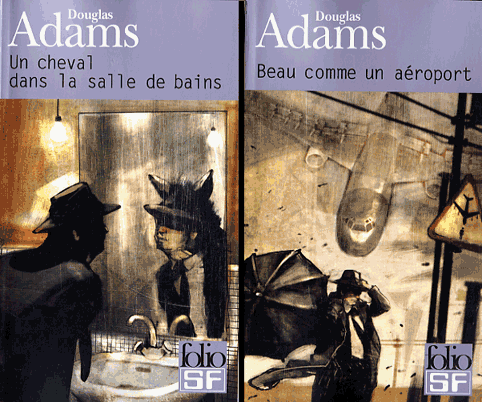I’m not even going to mess around with this nomination. It's "The Wall" by Pink Floyd.
Sure, I could briefly discuss other concept albums –
Sergeant Pepper’s Lonely Hearts Club Band, or
Tommy. Or, more recently,
American Idiot by Green Day. I could even suggest other albums that seem to be concept albums but are not acknowledged as such, like
Abbey Road, or, again, more recently,
Get Behind Me, Satan by The White Stripes. (True story: My horror story “
Astrid Forever” was inspired by the album
Get Behind Me, Satan. I listened to that album straight through and then again, and as I listened the second time, I began to have this story shape up in my mind and then I went and wrote
Astrid Forever, so thank you, White Stripes, and you, my readers, should buy that album and then put it on and
read Astrid Forever while you listen to it and see what I’m talking about.
I could do that, but there’s really no contest, is there? There’s really no two ways about this. The only possible Best Concept Album ever is The Wall, by Pink Floyd.

I won’t even get into the statistics about The Wall (because I don’t want to take the time to go look them up; you can do it if you’re interested.) The Wall is The Best Concept Album not just because of sales, not just because of great music, not just because of the storyline (which you can read summarized
here, and which I somewhat disagree with because I didn’t think that The Trial was in Pink’s head, and I’m not sure how much I trust Wikipedia, but it’s as good a summary as any) but because it casts its shadow even today. Schoolkids for dozens of years now have hooked onto the “We don’t need no education,” (an ungrammatical phrase which in its uttering probably proves itself false) and scared their parents, and then, lured in by that (as The Boy was, when he got into Floyd recently and so I bought him this album, which is why I’m writing this today) go on to check out the rest of The Wall and become hooked, too.
So I could go on and on about The Wall and I have, already, gone on and on about The Wall, but I’d like to try a little something different here. My reference to maybe-concept albums got me to thinking, as I wrote, about how we each bring something different to music, and therefore the artist sets out a plan for us, a scheme, but we interpret that through our own lenses, our own experience, which means that everyone experiences a concept album differently – and does so in a more dramatic way than we experience a book or movie or television show, because music is both more emotional and less literal. Music hits a deep primal feeling in us, right at the core of our essence, and so it drags more to the forefront and the surface than other art forms. And, music has no images or words and requires very little of us. With TV and movies, you’re told what to think: the image and music and all are presented to you. With books, you’ve got to do the work of reading to get to the imagination. With music, it’s force-fed to you like TV, but you’ve got to make the images and feelings link up yourself with your own experience and imagination.
So, to celebrate that, and to experience that, and to change things up a little, I’ve decided that this entry is an experiment, the experiment being:
What if I listen to The Wall in reverse? Not backwards, this isn’t a “Paul is dead” experience. No, it’s: create a playlist on my iPod, reversing the track order, and then listen to The Wall that way. Will it hold up? Will it relate to my life? Will I be able to draw some nostalgia out of it? Let’s find out as I blog my experience listening to The Wall in Reverse:
Esrever ni Llaw Eht:
(^^^Read it backwards^^^)10:56 a.m. I’m at my desk, it’s Saturday, I’m getting caught up from yesterday when I stayed home with A & B because they had ear infections, and I’ve just started the Grand Experiment. “
Outside the Wall” is first. Listening the right way, this is the sad, quiet, ending to Pink’s story. Leading off? “The bleeding hearts and the artists make their stand… when they’ve given you their all, some stagger and fall…” It’s a preface, a warning that something bad’s going to happen.
10:58. “The Trial.” This was always my favorite track on the album. It’s what I think Dresden Dolls are trying for. I like to sing along with this and act the parts. I also frequently think of “The Worm Your Honor” when I’m confronted with judges I don’t like. So far, so good, though. The first track ominously presaged The Trial, which is a dramatic way to start a story: The protagonist on trial – but for what? Showing feelings?
 11:03: “Stop.”
11:03: “Stop.” The first words after “
The Trial” finishes with the Wall coming down start with Pink saying “I
wanna go home… have I been guilty all this time?” Nice. The album is working backwards. That then goes right into “
Waiting for the Worms” with its stirring chords: “
Goodbye cruel world, it’s over, walk on by.” I’ve got goosebumps, really. I’m not making that up. This is an excellent song, the music is grand and solemn and portends even more. Here’s a question for discussion: “
In perfect isolation, here behind my wall.” Is The Wall more relevant NOW, with our reliance on the Internet and its impersonal ways to relate, including this blog? Discuss.
11:08: “
Run Like Hell.” I saw Pink Floyd in concert back in my concert-going days. We saw them at Camp Randall, and although it was years and years ago and the statute of limitations is probably passed, I’m not going to discuss anything that happened before or during the concert in any detail, except to say that during “
Dogs of War” it did seem like there were giant dogs going around the stadium, and during the part where the lasers made it seem like we were under water, my friend threw up. He’s a lawyer, now, too. I bring that up because I think Floyd played this song. When I went to the concert, the only song I knew by them was “
Learning to Fly.” I just went to be cool.
“
Keep your dirty feelings, deep inside.” That’s a lyric I just caught, followed by some threats to send the protagonist somewhere. So he’s served his time after The Trial that began this backward album, and now he’s on the outside, worried about going back.
11:13: “
In The Flesh.” The first version of this starts The Wall when you listen to it the regular way, and this comes pretty early on in the Backwards Wall. And it follows on my last observation/memory: “
So ya thought ya might like to go to the show, to feel the warm thrill of confusion, that space-cadet glow.” (Again, I’m not commenting on anything in particular, including whether there ever was a ‘space cadet glow.’).
But as the Backwards Wall goes on, our protagonist has gone from
The Trial to trying to keep his feelings inside, but here he is onstage, letting them all out: "
If I had my way I’d have all of ya shot!” This can’t be good.
11:17: It’s not good. “
The Show Must Go On,” and apparently our hero – let’s call him Knip – is regretting his actions at the Show. “
There must be some mistake… the show must go on.” We go right into “
Comfortably Numb,” which can be seen as Knip wanting to lock up his feelings so that the show can go on. “
I hear you’re feeling down, well I can ease your pain, get you on your feet again.”
I used to listen to “
Comfortably Numb” when I was laid up healing up from a broken neck suffered in a car accident. The painkillers they gave me gave new meaning to this song. And, another true story: When I was a child, I too had a fever and “
my hands felt just like two balloons.” I had to come home from school and everything.
Here we go though: Knip tells us “
I have become comfortably numb,” and is warned that he “
may feel a little sick,” but this will “
keep him going for the show.”
11:25. After a lot of talk about childhood in “
Comfortably Numb,” including “
the child has gone,” we get “
Bring The Boys Back Home.” Nostalgia? Missing the innocence of childhood? Or, in keeping with our themes, “
Comfortably Numb” talked about the fleeting glimpse Knip had of something in childhood, but now that’s gone. Maybe by bringing the boys back home, he could recapture… his feelings? He does mention
Vera, the next song -- his mother?
11:31: Some melancholy thoughts on “
Nobody Home” segue into “
Is There Anybody Out There?” with its slowly building ominous chords. It’s spooky. Knip has had his feelings numbed, and now is missing his childhood and his mother and is worried that there’s nobody out there at all…
11:34: This is really weird. I know the album is supposed to be circular in nature, but it does tell a story backwards, too, as “
Hey You” starts, and the story is easy to see: “
Hey you . . . can you feel me?” Knip repeats that line as he talks to the anonymous people around him. “
Don’t help them to bury the love/Don’t give in without a fight.” He’s warning the others around him: Don’t end up like me… “
Together we stand, divided we fall.” He's clearly regretting re-locking up his feelings. Remember, he was earlier "
caught red-handed showing feelings" and punished. But now he's not sure anyone can even relate to him.
11:40: “
Goodbye, Cruel World.” Well, that says it all, after the despair of the foregoing. “
There’s nothing you can say to make me change my mind, goodbye.” That’s followed by pounding and crashing and Knip yells out “I
don’t need no arms around me,” as “
Another Brick in the Wall Part 3” starts.
11:46 a.m. “
One of My Turns,” and a girl visiting Knip’s apartment. So he didn’t end it all. “
Don’t Leave Me Now” preceded this song and suggests that the girl is the one who saved him. Now, she’s back home with him. And he feels but maybe not the right way– “
I feel cold as a razor blade.” Or maybe he feels too much: He loses her, and asks “
Why are you running away,” and that song ends and we go right into “
Young Lust,” with Knip telling us “
I am just a little boy.”
11:56 a.m.: Knip is really sinking: “
What shall we use to fill the empty spaces where we used to live?” he asks. He’s cut off from the world and regretting his life.
12:02 p.m. “
Mother,” which I know how to play on guitar – aside from the solo, because I only play acoustic guitar and don’t do that exceptionally well – is on. Knip has retreated home to his mom, and seeks help from her. Her solution? “
Of course momma’s gonna help build the wall.” So we’re heading back to where Knip started. He began by being put on trial for showing feelings, then the wall was torn down but he couldn’t feel, or felt too much in a world that didn’t value personal interaction. Now he’s home worrying about what’ll happen, and Mother tells him not to cry. Where Knip a few songs ago told us he “
need[ed] a dirty woman,” (“
Young Lust”), Mother tells him “
Momma won’t let anyone dirty get through.” A commentary on how to survive in today’s world? Don’t go looking for feelings?
 12:07 p.m
12:07 p.m. “
Mother” ends with Mother telling Knip “
You’ll always be baby to me,” and Knip associates childhood with feeling. From there, it’s into “
Another Brick in the Wall (Part 2),” about schooling and education, finishing with a teacher yelling at the children. And then the repeated sound of a phone’s busy signal – something most kids these days don’t hear, I bet – symbolizing the lack of connection that existed even when Knip was a kid.
Remember busy signals? Growing up, we had one phone, with that ultra-long chord that would stretch almost to the couch but you mostly stood in the back hall talking, when you talked on the phone at all. We weren’t much for the phone, since all of our friends lived in the neighborhood and we’d just go call for them or they’d call for us or we’d just meet at the park. Nowadays, The Middle Daughter and Oldest Daughter text message each other on their cell phones. While inside the house.
But we’re already into “
Days of Our Lives,” which begins with an attack: helicopters and pulsating guitars. Knip is reminiscing about his childhood – and remembering that even then he’d try to hide his weaknesses. The swelling chords that show up at the end of that song, chords that gave a glimpse of hope that things were okay, abruptly end in this version and it goes into/
12:11 p.m.: “
Daddy’s gone across the ocean, leaving just a memory… Daddy, what else did you leave for me?” And the music is threatening again.
12:14 p.m.: “
The Thin Ice.” A baby crying, and someone telling Knip “
Mama loves you, baby, and Daddy loves you, too.” Maybe I was wrong a while back. Maybe Knip didn’t make it through that suicide attempt all that well. Maybe he’s in the hospital, and his family’s gathering around. And he’s talking to them, warning them: “
If you should go skating on the thin ice of my life… don’t be surprised when a crack in the ice appears under your feet.”
In other words: Don’t do what he did. Or you’ll end up with “
your fear flowing out behind you as you crawl on the thin ice.”
12:16 p.m.: “
In the Flesh?” Note the question mark in the title. The song begins with a voice saying quietly: “
Where we came in.”
The same quiet music we began with. Then bombastic guitars kick in. And Knip says to us:
“
So you thought you might like to go to the show,
To feel the warm thrill of confusion, that space cadet glow.
Tell me, is something eluding you sunshine?
Is this not what you expected to see?
If you want to find out what’s behind these cold eyes,
You’ll just have to claw your way through this disguise.”
Then he yells “
Lights.”
Then: “
Where are all the sound effects?’
Then: “
Action!”
Then he howls, the drums and guitars and instruments soar, and there’s the sound of a plane falling, falling falling falling, and then crashing.
And a baby cries.
And it’s over. Knip’s gone. He’s got cold eyes, he can’t hear, he sees lights. And
he’s dying – dead – unexpectedly.

So there: That’s Pink Floyd’s genius. Forwards or backwards, The Wall works equally well as a story.











